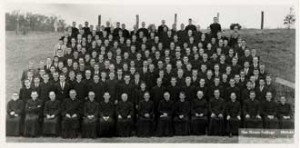
New book offers revealing glimpse into 1960s seminary life
By Pascal Zamprelli
The year is 1968. It’s Game Four of the Stanley Cup Finals and the Canadiens are nearly certain to win it all that night. But Spencer Boudreau, a young Canadian, Habs fan, and member of a Roman Catholic teaching order known as the Salesians of Don Bosco, has a problem. The bell for Vespers has rung in the upstate New Jersey seminary where he resides, and that means TV off, and everyone in the chapel to pray.
Feigning illness, he sneaks out of the chapel and up to where the superiors have a television set. Alas, there’s a priest in the room. “Oh no, I’m caught,” he thought. But it turns out the priest is from New Brunswick, and has skipped out on chapel too. “Come on in Spencer,” he whispered, “Belliveau’s getting the Cup.”
Boudreau, who today is a professor of education and McGill’s Ombudsperson for Students, has co-edited a book that makes one thing clear: there was much more to seminary life than prayer and silent reflection. We Were Brothers: Stories of Salesian Seminarians Who Followed a Dream is the collaborative effort of 35 of Boudreau’s fellow brothers, whose writings capture the unique and formative experience they lived together at Don Bosco College in the U.S. A book launch will be held on Monday, Oct. 26, from 4:30-6:30 at McGill’s Newman Centre, 3484 Peel St.
The book’s other co-editor is fellow seminarian George Stanton, whose son also happens to be a McGill undergrad. Stanton, Boudreau, and their college mates began meeting more frequently in recent years, thanks partly to an online group that led to more formal reunions. Annually, they get together somewhere in North America, discuss the yearly cause to which they contribute funds (the book’s proceeds will go to this year’s cause), and swap old stories.
“We would be telling these stories over and over,” said Boudreau, who soon decided they were worthy of being compiled and published, so others could benefit from the life lessons that flow from their studies, their friendship, and their lives together.
The strength of their bond lies not only in attending the same institution, but in their appreciation for the order’s founder, Giovanni Melchiorre [a.k.a. Saint John, a.k.a. Don] Bosco, a 19th century Italian priest whose life mission was to aid the plight of neglected youth.
“Don Bosco was very, very special,” Boudreau said, “and I even realized it more later on, as a professor in education. He was really very prophetic and avant-garde in his view of education. Engage the students, he said, be present.”
Even though only two of the book’s 35 contributors became priests, and today the former members practice Catholicism to largely varying degrees, the man ultimately responsible for bringing the young men together would forever shape their lives. Don Bosco’s legacy, teachings, and philosophy are still present in all of them, as is their shared gratitude for the education they received and the friendships that resulted.
“There’s always been an attachment, and the person of Don Bosco has become a rallying point,” said Boudreau, who still refers to the Salesians as “we.” It is evident in the bond they maintain decades later, in their camaraderie, even in their sense of humor. (Instead of referring to themselves as Salesian Old Boys, for instance, they prefer to use the acronym).
It is also evident in the paths they have chosen in life, religious or otherwise. “A lot of the guys are involved in what we would call the helping professions,” explained Boudreau, citing education, hospital administration, rights activism, and low-income housing provision as examples. “Many of them will say, ‘Oh, I’m doing Don Bosco’s work.'”
